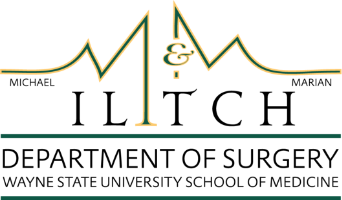Children’s Hospital of Michigan and its department of pediatric surgery serve as the primary clinical site and teaching faculty, respectively, for the Pediatric track of the surgical critical care fellowship. Prospective applicants have usually completed their general surgery training, while a minority pursue training after three years. Although not a requirement, the majority of fellows have a specific interest in pediatric surgery.
The Pediatric track provides the fellow with the opportunity to enhance their management of the critically ill surgical child by providing one-on-one care for patients in the Neonatal and Pediatric Intensive Care Units under the supervision of six pediatric surgery faculty, most of which are also board certified in critical care. The spectrum of diseases encountered includes, but is not limited to, congenital diseases such as congenital diaphragmatic hernia, congenital pulmonary airway malformations, tracheoesophageal fistula/esophageal atresia, abdominal wall defects (gastroschisis and omphalocele), neonatal bowel obstructions, Hirschsprung’s disease, and neonates with necrotizing enterocolitis.
In addition, patients requiring ECMO support are managed by the department. As a level I trauma center and pediatric burn center, fellows also enhance their surgical expertise caring for trauma and major burn patients. The gamut of pathophysiology allows the fellow to acquire procedural skills and techniques needed to provide optimal surgical care of critically ill children and allows graded and progressive responsibility, a goal of the training program.
The fellow participates in a weekly joint didactic curriculum with the pediatric surgery fellows and faculty which focuses on the basic science and clinical aspects of pediatric surgical diseases through pathology, radiology, M & M, research, and joint specialty combined conferences. Participation in the pediatric critical care didactic lecture series is also encouraged. Fellows are provided the opportunity to participate in the adult track’s weekly didactic and self-study curriculum to further enhance their knowledge base.
